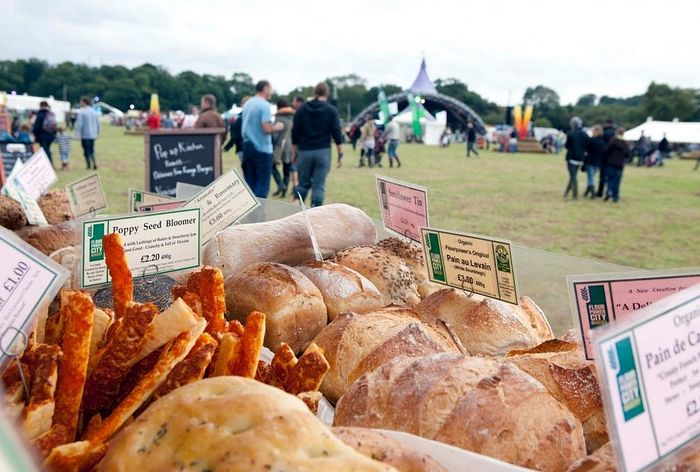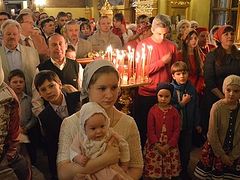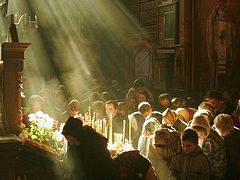Fr. Seraphim (Rose) used to say that monasteries and parishes should support themselves with “holy money”—that is, besides pious donations, earnings from businesses that are directly related to the Church’s ministry. That would mean selling things such as books, icons, incense, etc. Fr. John Klingel, an Orthodox priest serving in New York at St. Andrew’s Church in Dix Hills (OCA), also offers his reflections on this subject.
I had an interesting chat with a parishioner from another parish the other night. This parish is considering embarking on a fund raising program to finance some capital improvements. In our conversation, we explored the theory of raising funds and the means to do so, as opposed to simply increasing stewardship. Plenty of parishes operate quasi-businesses as a means of financial support. Selling things, bake sales, pierogis, raffles, ethnic food fairs, rummage sales, you name it. Some parishes raffle off cars if they are lucky enough to have a car dealer as a parishioner. But I have a philosophical bone to pick with this stuff. I wonder, what gives me the right, as a religious person, to stand in front of a Stop n Shop (a supermarket) and try to peddle an overpriced piece of cake as a way of paying my parish electric bills? And what kind of witness does this give to society? The Stop n Shop may grant my request to set up a table and sell my parish’s baked goods, but should I go this route in the first place? Very often it happens that the baked goods are donated by parishioners and so all the proceeds are “profit” but in the end, the earnings are meager when you consider the time, energy and effort. Add to this the inconvenience and lack of positive witness that this activity brings to the unwitting clientele who are forced to navigate past my table, and it seems questionable to me. More serious and sustained business use of a church property in order to raise funds may subject a parish to recognition of unrelated taxable income and/or loss of property tax exemption, both of which are highly undesirable. Finally, my strongest objection is that the enterprise can become a major distraction from what the parish is there to do in the first place: to be a Eucharistic community of prayer, worship and thanksgiving. Having forgotten this fundamental purpose, we see many parishes embarking on multiple courses and offering ancillary services to attract and retain members. And very often these programs require a sizable investment and infrastructure to maintain, which brings us back to required fundraising. For example, a basketball league requires a gymnasium and a coach, incurring many additional expenses.
A monk was once asked how he was able to survive, having no clearly identifiable means of support. He wisely replied, it is only necessary to see that one’s expenses are not allowed to exceed one’s incomes. Living simply, and within one’s means, is a discipline that bears powerful results. Parish life is much improved when stewardship sustains the common life and simplicity governs its economic life. Finally, the opportunity to bear the real expenses of parish life is a profound blessing for the parishioners, if they can sense this. Knowing that, were it not for their free-will offerings, the life of the parish would not be possible, they are able to see that it is their gifts that constitute the sacramental life. Their financial offerings are not any different than the offerings of prosphora, wine and oil that are likewise donated. Both have a sacramentality and both are essential. By means of these offerings, the parishioners can connect their individual professional and economic lives and their personal households with the common life and work of the parish. The money dropped into the basket as stewardship comes out of the family spending money for that week, but it also creates a relationship between the two in a mysterious and powerful way. All the more why the parish must be extremely conscientious about how this money is spent. It must be spent in a Eucharistic manner which gives witness to the faith of the community.
It saddens me when we see parishes and other church institutions engage in fundraising in a manner that is irresponsible. For example, often one sees a church bazaar or ethnic food festival scheduled to be held during a fasting period. Fund raising events such as golf outings and dinners will typically occur on Saturdays and conflict with or preempt the evening celebration of Great Vespers or Vigil. For years our churches have struggled with an addictive reliance on “bingo” as a source of funds, with some parishes holding these events multiple times each week. Under such circumstances it seems unlikely that a move away from such pernicious fundraisers and towards stewardship will ever be economically feasible. Reliance on income from raffles and games of chance clearly runs counter to a spiritual ethos in which we rely on God’s providential care for the satisfaction of our needs. If Christians must be enticed with the hope of a financial windfall in order to motivate them to provide for the welfare of churches, monasteries and seminaries, surely something is seriously wrong. Ultimately a culture of fundraising, once instilled in a parish, is destructive because it undermines what a parish ought to be about in the first place. Weekly reporting of income received—a staple of parish bulletin reporting—conveys the attitude that in the end, this is what counts in running a parish. Instead, the parish should be a place dedicated to prayer and its activities should encourage and promote a spirit and climate of prayer. Unnecessary distractions and entanglements such as fundraising events should be avoided at all cost. When people sense that our security and reliance is rooted in financial well-being and not in the Kingdom of God, they have clear evidence that our parish life is inauthentic and weak. Alternatively, when they see that our parish economy mirrors our economy of prayer and fasting, they are inspired to live in a spirit of generosity.





